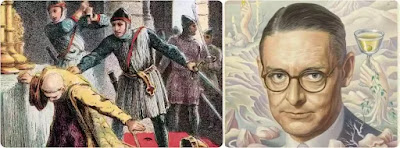Also Read
In a play such as Murder in the Cathedral, which has an obvious religious overtone, a "temptation scene" is very much in place. Thomas returned to Canterbury after seven years of exile in France. There is an apparent reconciliation between Thomas and Henry II. But there is a sense of foreboding that all is not peaceful.
Thomas Becket faces four temptations, each persuading him to leave the path he has chosen for himself. The Tempters are, of course, objectification of the confusion in the mind of Thomas. The temptations grow increasingly serious one by one. They would either have Becket avoid martyrdom or embrace it for the wrong reason. Indeed, the fourth tempter is unexpected to Becket. What he, offers is most damning - to do the right thing for the wrong reason. "It is the moment of greatest temptation, for this is a sin beyond the veniality of yielding to the senses, beyond the vanity of presuming authority, beyond the attractiveness of moving with the course of history. It is the sin of spiritual pride." Thomas overcomes these temptations, realizing the true nature of martyrdom, which is complete submission to God's Will and not an act of personal conscious will. Thomas's self-knowledge is expressed in his sermon in the Interlude. The Tempters serve to purify Becket's motives and this is what makes the play a study of gradual spiritual progression and enlightenment.
